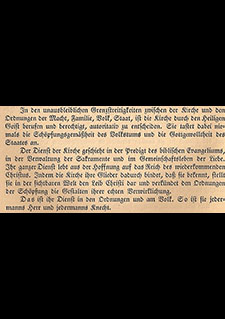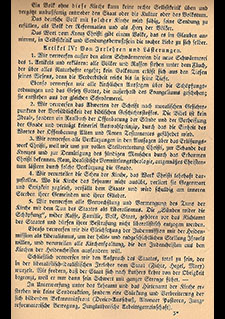Bochum Pentecost Confession
In bitter conflict with the local NSDAP authorities since 1927 because of various sermons and lectures, Hans Ehrenberg was one of the Confessing Church’s leading figures from the onset.
This was the setting in which the “Bochum Confession” was produced. It was read aloud from pulpits in Bochum and other locations in Westphalia on Pentecost of 1933. Bearing one hundred signatures, it was drafted by younger pastors from the Bochum, Gelsenkirchen and Herne Synods under the overall guidance of Hans Ehrenberg and Ludwig Steil.
Distinctive features are, first, the profession of faith in Jesus Christ as the son of the living God, the God of Abraham, Isaac and Jacob and, second, the emphasis on Israel’s theological right to exist and the condemnation of the exclusion of “Jewish Christians” from the church of all nations.
The “Bochum Confession’s” statements go significantly beyond the statements of the “Theological Declaration of Barmen”. This becomes especially clear in the passages that condemn the idealistic fanaticism of Volkstum (ethnic peoplehood) and blood and all biological racism as well as the concept of a total state.
In principle, the confession calls for a true church that prevents idolatry of the state, culture and Volkstum. Such statements established fundamental guidelines of the later Confessing Church. Ehrenberg’s negative view of every form of anti-Semitism expressed here and elsewhere decided his fate under National Socialism.
The well-known historian of Christianity Günter Brakelmann assessed the Pentecost Confession thusly: One is able to say that a comparably clear and compact theological statement such as the Bochum Pentecost Confession did not exist in the sphere of Protestantism in 1933.
Source / title
- Quoted from Kurt Dietrich Schmidt (Ed.), Die Bekenntnisse und grundsätzlichen Äußerungen zur Kirchenfrage des Jahres 1933, Göttingen 1934, p. 33–35.


